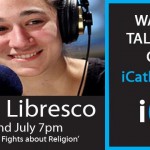This post is part of a debate with Justin of The Faith Heuristic. The topic is: The Evidence Supports the Existence of a God. The debate is structured as follows:
- Justin – Opening Statement
- Leah – Rebuttal
–part 1
–part 2 - Justin – Rejoinder
–part 1
–part 2 - Leah – Opening Statement
- Justin – Rebuttal
- Leah – Rejoinder
One last note to the reader: although I’m delighted to get to mix it up in cosmological questions, some of the scientific references may be a little obscure. If you’ve got the time to pursue it, I heartily recommend two great books for laypeople: Simon Singh’s The Big Bang and Leonard Susskind’s The Black Hole War. For now, I’ve included a number of Wikipedia links below, but please speak up in the comments if you’d like me to edit and flesh out any section.
Justin begins by pointing out that Big Bang theory forced atheists to ask where the universe came from. He is absolutely right to point to the advent of the Big Bang theory as a major crisis point for scientists. The convoluted intricacies of Fred Hoyle’s arguments for a steady state model of continuous creation testify to the intuitive horror that this discovery provoked in many scientists.
I’m on board with Justin up through “The universe/multiverse has a beginning.” Having agreed upon that premise, he puts forward the Kalam Cosmological Argument: a logical modus ponens argument, which takes the form of:
- If P is true, Q must be true
- P is true
- Therefore Q must be true
As expressed by Justin, the Kalam Cosmological Argument is:
- Everything that begins to exist has a cause
- The universe began to exist
- Therefore the universe has a cause
It is obvious from the above that I affirm the second premise. Therefore, it falls to me to either falsify the first premise or dispute the definition of ‘cause’ to the point where it doesn’t imply the existence of a god.
Everything that begins to exist has a cause
I am not confident that time has any useful definition prior to the Big Bang and the creation of spacetime. If this is true, we may regard time as having had a beginning in the same way (and at the same moment) that the universe had a beginning. So, does Justin’s logical framework apply to time itself?
Consider:
- Everything that begins to exist has a cause
- Time began to exist
- Time, therefore has a cause
What does it mean to say there is a cause of time before the existence of time? Causation is usually understood to be a relationship between two events such that Event A occurs before Event B and Event A logically requires that Event B occur. If we take the beginning of time to be Event B, how can we describe any Event A that occurs before the existence of time? There is no time for there to be a before in.
This is the answer to Justin’s question about the unique causal nature of the Big Bang and the reason why uncaused unicorns do not pop into existence in front of him or anyone else. Uncaused events take place outside of time, and, absent an being who can act outside of time, there is no reason to expect uncaused events after Time’s beginning.
This doesn’t offer much of an explanation for how time and space came into existence, but it does help to explain why our discussions of causality seem so poorly suited to this one event.
The above reasoning does not rule out the Big Bang being caused by an actor outside of time, but it does raise doubts about our ability to ascertain the truth value of any proposed cause for this event.
How would we distinguish between the universe as created by a deistic, timeless , and eternal First Cause and the universe as created by a decidedly more prosaic source (e.g. a simulation run by an alien scientist with a supercomputer in a universe operating under entirely different physical laws than our own)?
Given epistemological uncertainty about the metaphysical explanation for the Big Bang, a satisfactory explanatory theory cannot just explain this one data point. The kludged together cosmology of Fred Hoyle should make it clear to us exactly how easy it is to twist together any theory to fit a limited number of known datapoints. (Think about the infinite number of lines of the form y = mx + b that can be drawn through a single point, or the multitudes of curves that can be drawn through a collection of several points once we allow higher powers of x into our explanation).
For the uncertainty regarding the beginnings of the Big Bang to truly point to a deistic interpretation, the deistic theory would need to explain our questions better than any rival theory. This is not the case. If the deistic theory makes predictions that go beyond our current knowledge that are later verified, that is true evidence. This is how observations of Cosmic Background Radiation helped to clinch the case for the Big Bang. They showed that the Big Bang hypothesis was able to explain not only our current observations, but to go beyond them to predict and explain observations that had not yet been observed.











